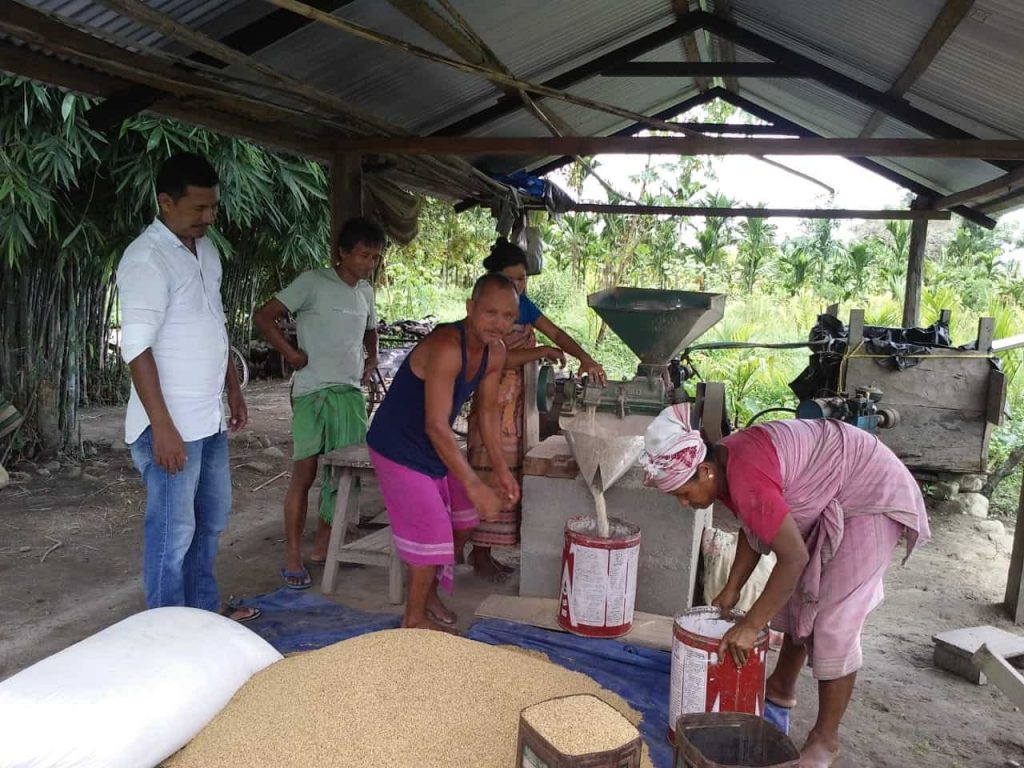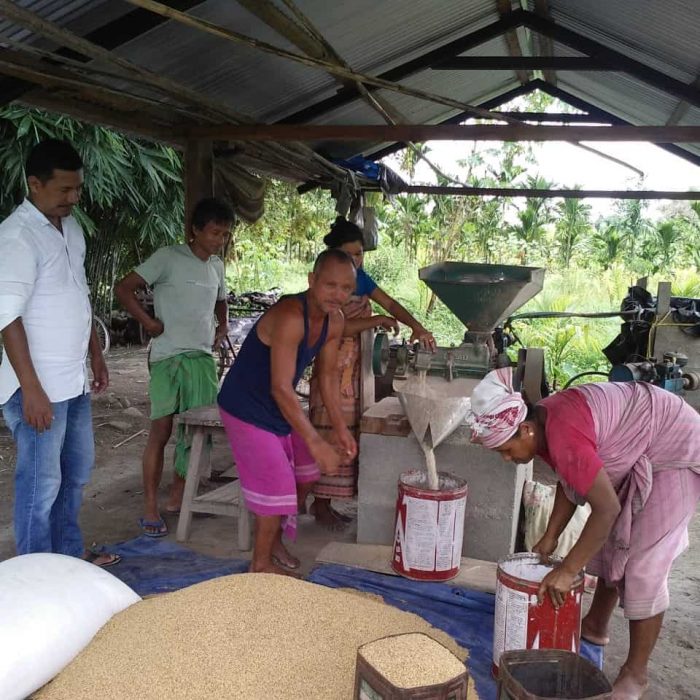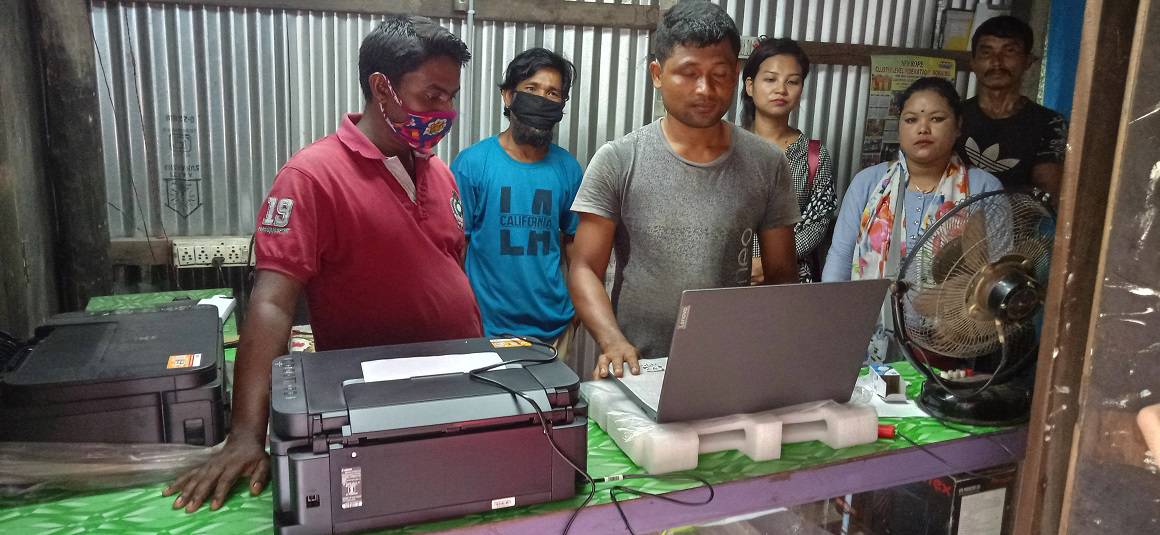
Livelihood Program 2013-14
Published At: 03/03/2023, Published By: NERSWN Admin
As the second year of intensive livelihood intervention in Jhawarbil and Sapkhata is on the verge of drawing close, the project team is jubilant about rapid progresses made in contributing towards improving the livelihood scenario. In the previous year, the project being hampered considerably due to terrible ethnic conflict in the area, this year it has picked up its momentum again. As reported earlier, the efforts are mainly channelized on building human capacities and promoting community institution to sustain the livelihood initiative undertaken by NERSWN in recent years and also to enable community to take charge of their life. It is with this intention following activities have been planned and implemented during the course of current project period:
- Planned Project Activities for the Year:
- � Setting up Farmers Resources Centre (FRC)
- � Creating Revolving Fund for FRC
- Setting up Seeds Bank.
- Capacity Building Workshop for Farmers Club.
- Training on SHG Management.
- Exposure Trip for Farmers Club and SHG Members.
- Promoting System of Rice Intensification (SRI).
- Support for Kitchen garden
- Horticulture Sapling Distribution.
- Training on Livestock Management in Collaboration with KVK.
- Pig rearing and Initiating Livestock Activities around Sapkhata.
Brief Narratives of the Activities Carried Out So Far: Setting up of FRC:
Total of 2 Farmers Resource Centres (FRC) has been formed and promoted. One FRC is being promoted at Hirlagar and second is in Jhawarbil. The Hirlagar FRC has been named as Eben Chasa Kouri Thwi with 20 members (Male 11 and Female 09). In Jhwarbil, “Jiar” FRC has been promoted with total of 13 members (8 male and 5 female).
Revolving Fund for FRC:
Each of the FRC has been supported with Rs. 20,000/- out of the NFI grant. The FRC is empowered to give loans to the farmers for different farm related needs in their jurisdiction. Extensive processes have been followed to set rules, regulation, facilitating effective understanding of the concept of FRC etc have been carried out. It’s a new concept for the farmers of the area and hence demands regular hand holding. The project team is making best of its efforts to extend all possible support to promote them as effective farmers institutions.
Setting Up Seed Bank:
In both Jhawarbil and Hirlagar, the seed bank has been initiated. Different varieties of seeds have been supplied by the FRCs on demand driven approach. Total of 30 farmers have taken high yielding variety seeds of Cabbage, Coriander, Radish, Brinjal, Tomato, chilly, Sponge Gourd, Okra (Jhinga), several leafy vegetables etc. These 30 farmers in turn were supposed to be supplying to other interested farmers. Approximately each of these 30 farmers has supplied seeds to 3 farmers each that have directly benefited 90 farmers.
Farmers Club Promotion:
Two (2) Farmer’s Clubs are being promoted in the previous year have been functioning well. This year several rounds of meetings have been organized by Farmers Club independently to discuss about various farm related activities. The farmer beneficiaries are selected by the Farmers Club. The farm related inputs such as knowhow, seed varieties, marketing etc are discussed and decided collectively by the members of the Farmers Club.
SHG Promotion:
So far 6 all women Self Help Groups have been promoted comprising 72 members. The SHGs are holding regular meetings. The group members are being train on group management, book keeping, leadership, democratic process to be followed, visioning exercise etc have been done. The groups have started collective savings and internal lending. Some have started internal lending for small scale livelihood expansion of the members. Adequate efforts have been made to link with bank and NRLM. But till date only two groups from Hirlagar could be linked through local federation. Process for inclusion of rest of the groups is on. The Self Help Groups of Jhawarbil are facing difficulties in linking up with NRLM as they are being considered as forest encroachers. Efforts are on to form federation of the remaining groups by mixing up with groups of revenue villages.
Exposure Trip for Farmers Club and SHG Members:
The exposure trip for farmers in Hirlagar and Jhawarbil has become like an annual event. This strategy has been really effective so far. When the agro-based livelihood initiative was started in the area, very few farmers were interested. In fact, after having lived in the relief camp for one and half decade, most of them have lost agricultural skills. But by meeting, seeing and interacting with the successful farmers in different parts of the state, the farmers have really become motivated. This year too, total of 20 farmers have been taken for exposure trip to see farming activities of local Krishi Vigyan Kendra, vegetable cultivation of Bamunkura Village, Milon SHG which has excelled in Mushroom culture and award winning farmer Mr. Rabi Saha, of Bhaoraguri who has really shown the path by large scale vegetable cultivation, green house farming, varmi-compose, floriculture, dairy farm and other items. After having visited the successful farming sites, the farmers of both areas were really motivated and it is evident from the increasing numbers of farmers in both the location.
Promoting System of Rice Intensification (SRI):
For last three years adequate efforts have been made to promote System of Rice Intensification Method among the farmers in and around Jhawarbil area, but the yields have not really increased. Hence, this year the project team has not taken up the SRI related activities. In the ensuing year, the team is planning to make another attempt. But total of 25 farmers have been motivated for paddy cultivation. The area being dry and acute shortage of water, very few families have lands that are suitable for paddy cultivation. In spite of this challenge, the farmers have been able to produce 8 to 10 Mon of paddy par bigha. Each of the families has cultivated 2 to 3 bighas of land. In the ensuing year, the project team is planning to motivate more numbers of families to cultivate paddy which can contribute towards food security of
the families in Jhawarbil.
Promoting Kitchen Garden:
As many of the activities are inter dependent, the seed bank has been instrument to support the farmers taking up kitchen garden activities. The two farmers clubs have chosen 30 farmers each based on the interest and need. Hence total of 60 farmers in turn have approximately helped another 180 farmers. But in Jhawarbil by this year almost all families have started cultivating vegetable witnessing the success of other families. Moreover, in last few years of settlement, the families have been able to purchase bullocks, buffalos etc which has also helped the farmers now to go for plough based agriculture (economy).
Many of the families have gone beyond Kitchen Garden method of cultivation; some of the farmers who have benefited from the Kitchen Garden method of cultivation now have started large scale vegetable cultivation.
Following is one of the narratives of the case which is representative of the items of vegetables being grown as part of the kitchen-garden concept of vegetable cultivation combined with the garlic and chilly in little extra proportion for better earning:
Mr. Ram Baskey (jeta bura)s of No. 1 Jhawarbil
Cultivation Pattern: Multi Cropping.
Area of cultivation: 1.5 Bighas
Vegetables: – Cabbage, Brinjal, Chilly & Garlic,
Total Item Wise Production and Sale
- � Cabbage yielded 250 kg. Sold 200 kg out of 250 kg at the price of Rs.10.00, earned Rs. 2000.00,
invested Rs.230.00, earned Rs.1770.00 - Brinjal yielded about 170 kg. Sold 150 kg. at Rs. 10.00, earned total Rs.1500.00, invested Rs.
230.00 and earned Rs. 1270.00 - Chilly yielded about 15 kg. Out of this sold about 10 kg at Rs. 70 per kg. earned total Rs.
700.00, invested Rs. 15.00 and earned Rs. 685.00 - Garlic yielded 100 kg. Sold 40 kg out of 100 kg at Rs. 60.00 per kg, earned Rs.1800.00 and restwill be sold when price rises, approximate total earning will be Rs. 5500.00 excluding the investment of Rs. 500.00 for seeds.
Total earning for the farmer in this season is 1770+1270+685+5500= Rs. 9225.00. This case is a representative of the rest of the farmers, some of whom have earned more and some them have earned less, so on an average, total of Rs. 9000.00 is being earned by the families who have followed the processes being facilitated by the Farmers Resource Centre and project team.
Principles of Kitchen gardening:
- Select well drained sunny area at the backyard near water source.
- Size and design of the garden depend on availability of land. However the garden should preferably be rectangular shape.
- Selection of crops is governed by your choice of the family, size of the garden and time available to devote in the garden.
- 200 sq.m. Area is sufficient for a five member family to supply 1.5 kg of vegetable per day.
- Quick growing fruit trees like banana, papaya, lemons etc. should be planted in the northern side of the garden and climbing type of vegetables like cucurbits, dolichos, etc. can be grown on the other side.
- To ensure steady and regular supply of vegetables, several sowing of a particular crop at short intervals should be done during the season.
- Ridges which separate the beds may be utilized for growing roots crops like radish, carrot, etc.
- Early maturing crops should be planted together in continuous beds so that the area can be made available at once for putting late crops.
- Interspaces of the long duration crops like brinjal, tomato, chilies, etc. may be utilized for quick growing crops like spinach beet, lettuce, knolkhol etc.
- One or two compost pits should be dug in the corner of garden to dispose the plant residues which will be reutilized as compost material.
Piglet Bank:
Till date total of 10 beneficiaries have received piglet loan from the piglet bank. 2 beneficiaries have sold the pigs at Rs. 6000.00 and pigs of 2 beneficiaries have died untimely. The process for third batch of approval for lending piglet is on. The appraisal committee is following the laid out procedures to be followed for sanctioning the loan. The beneficiaries are selected after the home visits and while visiting the women-headed households, destitute families, families with chronic illness and families with less income are being chosen. So far the recovery rate has been encouraging which has helped lending to others.
Horticulture Based Livelihood:
From last year’s initiative, this year total of 38 farmers have continued their Horticulture based livelihood. These farmers are growing banana, pineapple, lemon and black pepper. This year too efforts are on to expand this initiative and bring more and more farmers with horticulture based livelihood. In fact many families have taken up Horticultural activities. The bamboo plantation also has started. The areca saplings will also be distributed for replantation by end of April 2014. In a way the Horticultural activities are also gradually filling up the land of Jhawarbil area. The initial days dry and frustrating looks of Jhawabil is phenomenon of the past now.
Pig Rearing and Initiating Livestock Activities around Sapkhata:
As the land holding pattern of the Sapkhata and Hirlagar area is very small, one family on an average is having less than 1 bigha. In fact almost all the families of Hiralgar are just having homestead land which also belongs to the
government. Therefore, several rounds of discussion have been held with the Farmers Resource Centre of Hirlagar. After series of consultation, it is being decided to go for Poultry and Piggery farming in a big way. As part of the long term plan, 10 farmers will be supported from this financial year. The selection process is over, now the chicks and piglets will be distributed soon.
Training on Livestock Management in Collaboration with KVK:
The process is on to impart the training. The training will be imparted at local Krishi Vigyan Kendra. Initial discussion have already been made once the general election gets over, total 20 farmers from both Jhawarbil and Hirlagar will be imparted training on livestock management.

Livelihood Program 2011-12
Published At: 03/03/2023Experimenting ideas, sharpening skills by dirtying hands and legs, seeing...

Livelihood Program 2012-13
Published At: 03/03/2023Promoting Basic Livelihood for the Displaced-An Initiative of Enhancing Livelihood...
